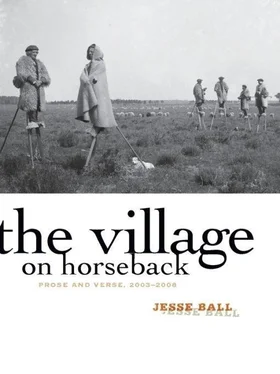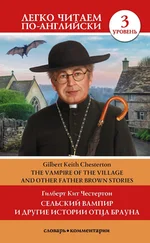Jesse Ball - The Village on Horseback - Prose and Verse, 2003-2008
Здесь есть возможность читать онлайн «Jesse Ball - The Village on Horseback - Prose and Verse, 2003-2008» весь текст электронной книги совершенно бесплатно (целиком полную версию без сокращений). В некоторых случаях можно слушать аудио, скачать через торрент в формате fb2 и присутствует краткое содержание. Год выпуска: 2011, Издательство: Milkweed Editions, Жанр: Современная проза, Поэзия, на английском языке. Описание произведения, (предисловие) а так же отзывы посетителей доступны на портале библиотеки ЛибКат.
- Название:The Village on Horseback: Prose and Verse, 2003-2008
- Автор:
- Издательство:Milkweed Editions
- Жанр:
- Год:2011
- ISBN:нет данных
- Рейтинг книги:5 / 5. Голосов: 1
-
Избранное:Добавить в избранное
- Отзывы:
-
Ваша оценка:
- 100
- 1
- 2
- 3
- 4
- 5
The Village on Horseback: Prose and Verse, 2003-2008: краткое содержание, описание и аннотация
Предлагаем к чтению аннотацию, описание, краткое содержание или предисловие (зависит от того, что написал сам автор книги «The Village on Horseback: Prose and Verse, 2003-2008»). Если вы не нашли необходимую информацию о книге — напишите в комментариях, мы постараемся отыскать её.
Samedi the Deafness
The Way Through Doors,
New Yorker’s
The Village on Horseback
The Village on Horseback: Prose and Verse, 2003-2008 — читать онлайн бесплатно полную книгу (весь текст) целиком
Ниже представлен текст книги, разбитый по страницам. Система сохранения места последней прочитанной страницы, позволяет с удобством читать онлайн бесплатно книгу «The Village on Horseback: Prose and Verse, 2003-2008», без необходимости каждый раз заново искать на чём Вы остановились. Поставьте закладку, и сможете в любой момент перейти на страницу, на которой закончили чтение.
Интервал:
Закладка:
Yet they’d whipped him and let him go, and his father had paid a price for the draft-horse.
They’d forced Pieter to put the horse down, just to show him the weight of what he’d done, but that was a lost act, for he’d killed the horse with care and even sad pleasure, stroking its face and quieting it, then firing a pistol into its head.
Who supposes any fairness is a fool, thought Elsbeth, and when Pieter went, back raw and bleeding, to his hiding place, it was she was there to clean his back and sit with him.
Off the road, then, Elsbeth drew. She pushed the horse further, and turned to look back.
Movement and dust. Along then, the mayor’s party, some twenty strong, riding slowly. Two and two carried a long pole, the mayor at the head, and from the pole hung a body, beaten and broken. On the pole a body hung. It was Pieter, stripped to his waist, slack with his mouth agog, chest blooded.
Falk’s face was triumphant. He was a large man, and he wore his happiness openly now. He did not look to left or right, or he would have felt Elsbeth’s eyes bore into him.
— You’ve killed him.
She dropped the reins and stepped forward.
Then the pole flickered. It flickered, and there was no one there, the horsemen were carrying an empty pole. She blinked and looked back. Pieter was again strung on the pole, slack in death, and then the horsemen were gone out of sight.
What was that? she wondered.
And a strange feeling made her say, I will continue to his house, to see what they have done.
The horse was waiting deeper in when she went to fetch him. He looked at her with his long horse eyes, and she felt that someone was looking through the horse’s eyes, that someone could see her there where she was. She pulled the horse’s head away from her, but it strained and turned and again it was looking at her.
— Come now, she said. Come along.
She rode on, but slower, and after a little while, came to where the road rose to overlook Pieter’s holding. The line of trees wound like bunching thread up and around, holding the hill in a green fist, and there,
there, the house was burned to the ground. Where she had sat yesterday was ashes. She rode closer, and as she rode, the house flickered, flickered and was there.
She urged her horse on. Smoke was coming from the chimney. The door was opening. Pieter was alive. She was sure.
Elsbeth climbed down from the horse and ran up to the steps.
— Pieter, she called. Pieter!
||||
— Elsbeth, said Pieter. Did I not tell you there was no worry here?
— But, I saw you, she said. I saw you on the pole.
— Some other man. Without luck. Perhaps not so clever as I.
— I saw you. It was you.
Pieter looked down at his feet.
— Those who came, said Pieter, felt they put me on the pole, felt they took me with them. They have seen my house burn. They have shown themselves to be that which they hate, that which they want to chase away out of the village. Well, there is a visiting that proceeds, that has proceeded this week in the town. Someone has been visiting, has he not?
Elsbeth was looking at her Pieter and her eyes were shining.
— I am glad, she said, that you are not on that pole. Whatever it means.
— Come and sit, said Pieter, for there was a supper laid out on the table. I will tend to your horse.
And he went out the door and down the steps. Through the window she could see his head laid against the horse’s head, though she could not hear his speaking there.
What is it you have to say to horses at evening? What understanding have you made?
She troubled him again and again with questions. How is it she had seen him on the pole. But he would say nothing about it, and would turn silent and cold, so she left off.
I will know in time all this, she thought.
And then Pieter was again with her, and serving the meat, which was a pale red meat, like venison. He had bread he’d baked, butter, cheese and fresh milk. She ate with a hunger she had never felt, ate and ate. Pieter ate too, and between them, they ate all that had been laid upon the table.
He showed her a silver glove he had made from the thinnest links.
— One wears it in the first hour of dawn, and chance goes a little ways with you on the road.
Scarcely do I believe it, thought Elsbeth, and Pieter smiled.
From a hollow place in the wall he took out a long crook. It was reddish in color, with streaks of white.
— Have you sheep? she asked.
— I have had sheep, he said, though none now.
The door to the outside was open and a cat came in.
Behind it was another cat and another.
— These go everywhere together, said Pieter. For they each know what’s best for one of the others, but never for themselves.
He gave Elsbeth a bowl and she poured milk for the cats and laid it on the ground.
— I will show you a thing now, said Pieter, as he lit the candles in the wall sconces.
He went to the door at the far end of the house and turned the handle, and beneath his hand it turned easily.
Elsbeth followed him in. He lit a candle and another and another, and the room was full of light.
What can be said of that room? There was a bed placed, as the others, in one wall. There was a broad window, widest of the house, looking out over the hill away from the road.
But most stirring, most unforeseen, most impossible of all, at the center of the room was an enormous loom, the best she had ever seen.
It was rooted to the ground upon legs like the legs of a young animal, sure in its strength. Its frame rose up, figured and etched. The wood was ebony, ebony all through.
— It can’t be, said Elsbeth. It’s made from a single piece of wood.
— It was brought here for you, said Pieter, many years ago, by a young man, building a house from his thought and wishes. He considered that perhaps Elsbeth might come one day out along the low road.
Then he brought out a bottle of warm drink, and they drank a glass together, and he left Elsbeth to her room, and left, closing the door.
And the first part of the night she spent running her hands over the loom, and taking up the thread that was at hand and stringing it.
And the next part of the night she slept in the bed that had been made for her, and it was hers then to lie in a deep place.
What can be said of waking in that house? That the dreams of the night before stood in turn to be examined, waiting with a patience unheard of?
Elsbeth remembered first:
A word learned by listening every day for years at a hole in the ground. Years and years passing and finally the word is said.
Then, all the through the town, all through the world one goes and no one can stand against one. The word is said, and houses are laid upon their sides, clouds form into veins that carry sight farther and farther than ever before. Can you see? asked the dream, the true depth of sight when one abandons the direction of one’s life and takes to a single task, takes to listening at a hole in the ground, years and years, and finally a word is said?
That was the first dream.
The second:
A room full of coats. A coat of bird feathers, a coat that is the skin of a man, a coat that is the skin of a bear, the scales of a fish, the skin of a cat, of a mouse, of a snake, of a mule.
Then out that room and into another, where three suns rise in the farther sky. Men devoid of color sit playing at chess on a hundred tables. The pieces move untouched from square to square, and smoke rises from the ground where feet touch.
— There is no dust here, says the man who stands directly behind and cannot be seen.
— Do you know what that means, for there to be a place without dust?
Читать дальшеИнтервал:
Закладка:
Похожие книги на «The Village on Horseback: Prose and Verse, 2003-2008»
Представляем Вашему вниманию похожие книги на «The Village on Horseback: Prose and Verse, 2003-2008» списком для выбора. Мы отобрали схожую по названию и смыслу литературу в надежде предоставить читателям больше вариантов отыскать новые, интересные, ещё непрочитанные произведения.
Обсуждение, отзывы о книге «The Village on Horseback: Prose and Verse, 2003-2008» и просто собственные мнения читателей. Оставьте ваши комментарии, напишите, что Вы думаете о произведении, его смысле или главных героях. Укажите что конкретно понравилось, а что нет, и почему Вы так считаете.












